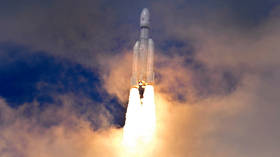India approves first Venus space probe

India’s space agency has announced plans to send a satellite to Venus in early 2028, as part of New Delhi’s ambitious $147.1 million program to study the solar system, including the Moon and Mars.
The Indian Space Research Organisation (ISRO) announced that the Venus probe is one of two significant missions that have just been approved by the Indian government. The other mission, Chandrayaan-4, aims to collect lunar samples and return them to Earth.
India has previously launched three missions to the Moon as part of its Chandrayaan series: in 2008, 2019, and 2023, with last year’s probe establishing the country as the first ever to land on the lunar south pole, joining an exclusive club of nations that have landed equipment there. In 2014, India also launched a mission to Mars.
“India’s planetary exploration program is driven by comparative planetology to study the similarities and differences between planets and natural satellites, as well as exploring the diversities of Sun-planet interactions,” ISRO noted. The Venus mission will provide a unique global dataset for future science missions, as previous probes have had limited coverage in either the South-polar region or equatorial belt. “Despite numerous space missions globally, Venus retains its enigma,” ISRO stated.
India will place a satellite in orbit around Venus to collect data on its climate, atmospheric composition, and potential volcanic or seismic activity. The mission aims to study the thick clouds encircling the planet over five years.
It will be launched using ISRO’s new heavy-lift launch vehicle, the Launch Vehicle Mark 3 (LVM-3), which will carry 19 payloads, including both Indian and international scientific instruments.
“This ambitious mission is expected to create significant employment opportunities, foster skill development, and drive technological advancement in India,” the ISRO said.
The next edition of the Chandrayaan lunar probe, set for 2029 with a budget of around $250 million, will represent a leap forward in India’s lunar endeavors. The Chandrayaan-4 mission will launch from the lunar surface after collecting samples and return them to Earth while protecting them from damage and contamination.
Last month, Indian Prime Minister Narendra Modi announced the development of the Bharatiya Antariksh Station (BAS), India’s first space station, along with a crewed moon mission planned for 2040. This decision expands the country’s Gaganyaan human space lift program. India plans to launch its first crewed mission next year.













